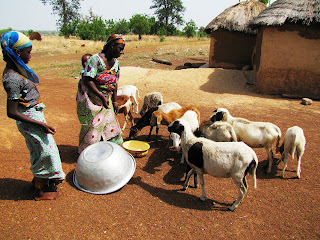By Joseph Ziem
Members of the Tamale Metropolitan Assembly in the Northern Region of Ghana, have charged the government to come out and explain to Ghanaians mostly especially Northerners, the criteria it used to disburse the oil revenue among all the ten administrative regions in the country.
They have described the criteria used for disbursing the oil cash as fraught with inequity and smacks of insult to some section of Ghanaians, considering the fact that some regions have been allocated huge amounts of money, whereas others have also been given derisory amounts.
The disgruntled Assembly members, say they simply could not fathom why all the total percentage share of for instance, the three regions of the North – Upper West, Upper East and Northern Regions, put together is not even up to 6%, demanding an urgent explanation from the government.
“We feel the Mills-Mahama led administration of the ruling National Democratic Congress has been unfair to the entire North in the distribution of national resources if what we are hearing and seeing is anything to go by”, the Assembly members protested during a forum organized by Accountability and Good Governance Network (AGNet) with support from the Ghana Developing Communities Association (GDCA).
Information from the Ministry of Finance and Economic Planning made available by AGNet to participants at the forum, showed that the Eastern Region was allocated GH¢63,821,794.84 (38%), Brong Ahafo Region GH¢18,218,381.52 (10.8%), Western Region GH¢16,946,647.10 (10%), Ashanti Region GH¢12,864,004.37 (7.7%) and Volta Region GH¢8,365,521.64 (5%).
The rest include Northern Region with GH¢5,099,412.00 (3%), Greater Accra Region GH¢3,935,581.31 (2.3%), Central Region GH¢2,553,931.81 (1.5%), Upper West Region GH¢ 2,012, 082.59 (1.2%) and Upper East Region GH¢1,650,000.00 (1%).
Going by the aforementioned statistics, the regions with the lion’s share include Eastern, Western, Brong Ahafo and Ashanti Regions. This is because, in the opinion of some participants, their share of the oil money was more than GH¢10million each. “What serious or urgent development priorities does the NDC government have in the Eastern, Western and Brong Ahafo Regions, that the share of each of them is more than the total amount of monies allocated to the three regions of the North, which are always considered the poorest in the country?”, one of the Assembly members (name withheld) queried in an interview with this writer.
Although there is an allocation to agriculture projects in the Northern Savannah area according to the information presented by the NGO, most of the Assembly members agreed entirely that the amount (GH¢848,917.00, 0.5%) was too scanty, considering the fact that climate change effects were seriously beginning to affect farming activities, thus the need for government to consider huge capital investment in agriculture in the North.
While they also demanded from the government to disclose the exact total share of the oil revenue it so far got from the Jubilee field partners, the Assembly members further called for the establishment of a long term development plan to guide the judicious use of the oil revenue. In their estimation, the plan would also guide every government that comes to power to know where it can spend money on by considering the development priorities of the country.
On the other hand, the Assembly members chided the three members of parliament in Tamale including Alhaji Abubakari Sumani, Tamale North, Alhaji Inusah Fuseini, Tamale Central and Iddrisu Haruna, Tamale South, for their frequent absenteeism from quarterly meetings organized by the Assembly to explain government policies such as the oil and gas policies to them to enable them also get their people informed.
Meanwhile, a communiqué jointly issued and signed by Prince A.A Mohammed, Assemblyman for Fooshegu Electoral Area and Presiding Member of the Tamale Metropolitan Assembly and Damma Salifu, President of AGNet, said if the development gap between the North and South must be bridged, government would have to ensure that the oil revenue was equitably distributed, that is, the regions with more needs should be given more allocations and those with less needs given less.
The communiqué called for a review of the criteria that was used for the disbursement of the fund because in their estimation, the process was unfair. “The three regions of the North are the poorest and need more resources to develop. Thus, allocations to each of the three regions must be increased to 10%”, it stressed.
It also recommended that the amount of money allocated to the agriculture sector should be increased to 20% instead of the 7% and that the three regions of the North should be given more priority in the use of such monies. “More attention must be paid to the agric sector to ensure that it is more productive so that the youth will not be tempted to migrate to the oil producing areas in search of greener pastures”, the communiqué emphasised.
The communiqué also observed that the 79.8% of the oil money earmarked for the construction of roads was very necessary but called on the government to endeavour to use 30% of the amount to construct roads in the three regions of the North.
Moreover, the communiqué asked the government to use the GH¢750,000.00 representing 0.4% of the oil money allocated for capacity building in areas related to oil and gas to support rural education in the three regions of the North and also ensure that the capacity building does not benefit only those in the southern sector.
The workshop organized by AGNet in collaboration with GDCA was part of the implementation of its citizen-government engagement program, that aimed at building the capacities of communities with relevant information and skills to enable them effectively engage duty bearers to be accountable to their people.
It was also intended to sensitise members of the Tamale Metropolitan Assembly on issues surrounding the oil and gas industry and seek their opinion with regards to how government should use the oil money.


